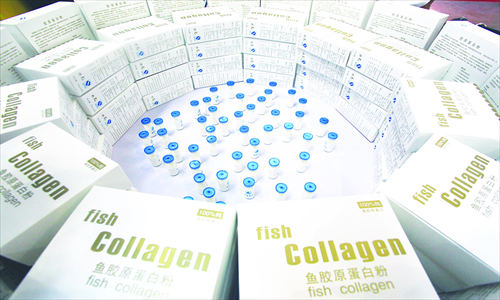Home >> BUSINESS
Collagen concern
By Fang Yunyu Source:Global Times Published: 2013-6-4 23:48:01

Collagen products displayed at an exhibition in East China's Fujian Province. Photo: CFP
Large pharmaceutical companies have seen a boost in their sales and share prices from the recent popularity of collagen, a product that is believed to smooth and firm skin, and help people look young.
However, late last month, some of these listed companies saw a significant decline in their share prices.
On May 23, the share price of Shenzhen-listed Baotou Dongbao Bio Tech Co, which has a national patent for soluble collagen, closed down 3.86 percent at 11.2 yuan ($1.83).
The slide was caused by controversy surrounding collagen, as some medical experts said on their Sina Weibo that there is no difference between collagen and ordinary food in terms of protein content.
It has led to concerns that the health and beauty claims about collagen products could be false.
Just a scam?
On May 19, a doctor at the burn surgery unit of Beijing Jishuitan Hospital wrote on his Sina Weibo that "all the orally ingested collagen products are a scam, no matter how effective they claim to be."
The doctor, who did not reveal his name, explained that after digestion, collagen disintegrates into amino acids, which are also found in the proteins in common food such as meat, eggs and soy beans.
"The best result you can hope for after eating collagen is no effect," the doctor said. "It would be more dangerous if you found the collagen effective, because then estrogen must have been added to the product."
A declining level of estrogen will lead to thinning of the skin, as well as wrinkles and dryness. But higher levels of estrogen can potentially cause breast cancer.
The doctor's claim was soon echoed by several nutritionists and other doctors online. Some even warned that consuming collagen could harm kidney function.
Soon after, companies producing or selling collagen started to be affected.
Dongbao Bio released a statement on its official website on May 30, citing a doctor who said that collagen's effects have been widely recognized in the US, EU, Japan and China, and adding that it can offer health benefits.
"Collagen's popularity in China shows that it meets consumers' demand for being young, internally and externally," reads a statement from Lumi, a collagen producer.
Zuo Wenjun, a veteran plastic surgeon and deputy head of Shanghai Time Plastic Surgery Hospital, told the Global Times Tuesday that oral collagen supplements can provide amino acids and peptides, which are necessary components for keeping skin elastic.
"It is like eating pork trotters in a drink or powder form, but not as greasy. Some people like oral collagen products because they don't want to gain weight," said Zuo, noting that the product is not always as effective as consumers expect.
Zhu Jiajia, a 27-year-old office manager based in Shanghai, who has been drinking collagen beverages for two years, told the Global Times that she thinks collagen can help her resist the aging process.
"Many stars look young and they said they have used the collagen products," said Zhu.
But Zhu noted that some of her friends are more wary, and did not feel anything after drinking collagen products.
Market growing anyway
While the science world debates the actual effects of collagen, there can be no doubt about the size of the market. Some say it is related to the Chinese notion that "you are what you eat." For example, Chinese people eat fish eyes as they believe it improves eyesight.
In beauty shops such as Watsons stores, many collagen products can be seen, including beverages and cookies. Beverages are usually the most expensive, ranging from 10 yuan to 30 yuan for a 50 milliliter bottle.
According to the 2012 financial report from Dongbao Bio, the gross profit margin from its collagen products reached 38.89 percent. The company's profit also surged to 35.4 million yuan last year, up 43.4 percent from 2011.
Guizhou Bailing, another domestic collagen producer, said that it expects collagen product sales to reach 1.38 billion yuan this year, with a profit margin of 32.9 percent.
A beauty industry insider told the Global Times Tuesday on condition of anonymity that the raw materials of collagen, which is mostly pig skin and cow bone, do not cost much, compared to the retail price.
"It's similar to medication. Raw materials occupy a small proportion of the sale price. Other costs, like research and development, marketing, and distribution channels, account for the most," said the insider.
According to Shi Lichen, a pharmaceutical partner at Beijing-based Alliance PKU Management Consultants, the benefits from collagen are uncertain, as the low cost involved in producing it is an open secret in the market.
Shi said that the raw materials for collagen production cost about 80 yuan per kilogram. But in the final product, the price is around 1,700 yuan per kilogram.
"The market is still chaotic, due to insufficient regulation and the absence of industrial standards," said the beauty industry insider.
But no matter how controversial the product is, the market will continue to grow, he said, with demand set to grow as Chinese people become more wealthy.
According to a report from Rising Securities earlier this year, China's market demand for collagen will continue to rise at a pace of 20 percent annually, and the annual output value is expected to reach 100 billion yuan in 2015.
"Many women come to our clinic to get collagen injections," said Pan Huidong, an MD at Shanghai-based Yujia International Medical Cosmetology Center, noting that people pay more attention to their looks these days, and want to stay young and confident as long as they can.
Pan admitted that the effect of collagen only lasts for a limited period of time, but the clinic is still planning to expand into second- and third-tier cities in years to come.
Posted in: Insight